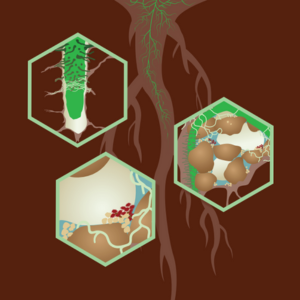
How Soil Microbes Benefit Plants
• Increasing nutrient availability
• Mineralizing organic matter in the soil
• Increasing root mass and root hair proliferation
• Increasing the ability of plants to tolerate stress
NUTRIENT AVAILABILITY
Microbes improve nutrient availability in multiple ways. Bacteria play a key role in organic matter mineralization, which releases plant-available nutrients in the soil. Bacteria also promote the production of enzymes, such as proteases and phosphatases, which increase nutrient availability. The production of organic acids (malic, lactic, citric, etc.) in the rhizosphere is also promoted by bacteria. These acids lower the pH of the rhizosphere, which increases the availability of phosphorus and most of the essential micronutrients.
ROOT MASS AND ROOT ARCHITECTURE
There are multiple microbes that are known to stimulate lateral root development and root hair proliferation. This increased root mass results in greater opportunity for nutrient uptake by the root system of the plant. Root hairs are the most effective root tissue for uptake of water and nutrients. Increased root volume can also provide better anchoring of plants and improved stress tolerance of plants.
STRESS TOLERANCE
Stressed plants release compounds that signal microbes to colonize roots. The microbes then cause a plant response that allows the plant to better tolerate the stress. Examples include production of antioxidants within the plant, closure of leaf stomates, and production of key stress compounds.
SOIL STRUCTURE
Microbes assist in the production of polysaccharides, which help bind soil particles into aggregates and better structured soils. Increased aggregation tends to improve soil health with more efficient drainage, water holding capacity and water infiltration.



